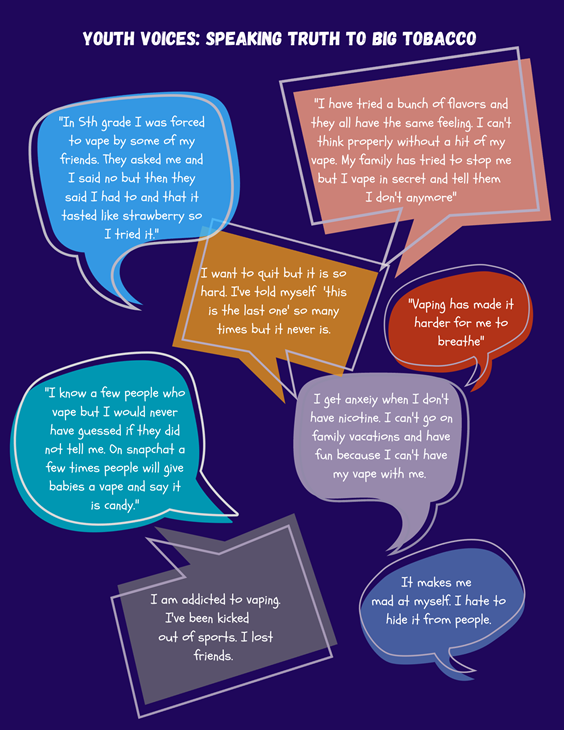STRATEGY INTRO: Support a Media Campaign to educate BIPOC communities about the proposed statewide tobacco flavor ban, and work with area sports teams to find out what people/youth know and feel about flavored tobacco products. Focus groups and media message testing will be done to determine what the community needs to know and what messages related to flavor bans would appeal to which cultural groups. We will focus on young athletes from pan-Asian and pan-African communities, and a media campaign featured the young athletes based on what the message testing reveals.
Asian Media Access has joined the “Minnesotans for a Smoke-Free Generation” MSFG Coalition to raise awareness for the benefits of ending the sale of all flavored commercial tobacco products — including menthol cigarettes, flavored cigars, e-cigarettes, hookah, and smokeless tobacco — to prevent youth addiction, advance racial and health equity and create a healthier future for everyone.
Flavored products are a key reason Minnesota is facing a youth tobacco epidemic:
- In Minnesota, one in seven 11th graders uses e-cigarettes, and 88 percent of those students use flavored e-cigarettes.
- More than 70 percent of youth e-cigarette users in Minnesota are showing signs of nicotine dependence.
- Seven in 10 youth say they use e-cigarettes “because they come in flavors [they] like.”
- In Minnesota, 78 percent of 8th-graders and 85 percent of 11th-grade tobacco users report they use a flavored product.
Flavored products mask the harshness of tobacco, and are luring kids into addiction:
- The tobacco industry deliberately uses flavors to attract the next generation of tobacco users.
- Today’s popular e-cigarettes contain high levels of nicotine which harms the adolescent brain development and primes youth for addiction.
- Candy and fruit flavored tobacco products mask the harsh taste of tobacco and are often perceived to be “safer,” but the use of such products, including menthol cigarettes, can still lead to cancer, heart disease and chronic pulmonary disease.
- Flavored hookah products are also targeted at youth. Hookah use is not unique to any community or culture and is becoming increasingly common among young people from many different backgrounds.
- According to doctors and health experts, tobacco use sets kids up for a lifetime of nicotine addiction and serious health conditions like heart disease and cancer.
Flavored products mask the harshness of tobacco, and are luring kids into addiction:
- Menthol flavoring makes it easier for kids to start smoking and harder for adults to quit.
- For decades, tobacco companies have channeled menthol tobacco products into Black communities, causing death and disease.
- Nationally, 85 percent of Black people who smoke use menthols, versus 29 percent of white smokers.
- The tobacco industry uses menthol to target Black Americans, LGBTQ communities, and youth.
- Among Minnesota teens who smoke, 33 percent report smoking menthol cigarettes.
- In Minnesota, smoking rates among American Indians are at epidemic levels (59 percent), and 42 percent of urban American Indians who smoke use menthol cigarettes.
Reference:
1. Minnesota Department of Health. 2022 Minnesota Student Survey.
2. Minnesota Department of Health. 2020 Minnesota Youth Tobacco Survey, 2021
3. U.S. Department of Health and Human Services, Food and Drug Administration, Center for Tobacco Products. Modifications to Compliance Policy for Certain Deemed Tobacco Products Guidance for Industry DRAFT GUIDANCE. 2019.
4. Minnesota Department of Health. 2022 Minnesota Student Survey.
5. Ritchy AP (RJR Tobacco). Apple Wine Cigarette Project. 1972. http://legacy.library. ucsf.edu/tid/buq49d00/pdf.
6. Jackler RK et al. Nicotine arms race: JUUL and the high-nicotine product market. Tob Control. 2019.
7. U.S. Department of Health and Human Services. E-Cigarette Use Among Youth and Young Adults: A Report from the Surgeon General. 2016.
8. Muthumalage T et al. Inflammatory and oxidative responses induced by exposure to commonly used e-cigarette flavoring chemicals and flavored e-liquids without nicotine. Front Physiol. 2017.
9. Behar RZ et al. Identification of toxicants in cinnamon-flavored electronic cigarette refill fluids. Toxicol In Vitro. 2014.
10. Allen JG et al. Flavoring chemicals in e-cigarettes: Diacetyl, 2,3-pentanedione, and acetoin in a sample of 51 products, including fruit-, candy-, and cocktail-flavored e-cigarettes. Environ Health Perspect. 2016.
11. Bitzer ZT et al. Effect of flavoring chemicals on free radical formation in electronic cigarette aerosols. Free Radic Biol Med. 2018.
12. Momenabadi, V., Hossein Kaveh PhD, M., Hashemi, S. Y., & Borhaninejad, V. R. (2016). Factors Affecting Hookah Smoking Trend in the Society: A Review Article. Addiction & health, 8(2), 123–135.
13. U.S. Food and Drug Administration. Preliminary Scientific Evaluation of the Possible Public Health Effects of Menthol Versus Nonmenthol Cigarettes. 2013.
14. Gardiner PS. The African Americanization of menthol cigarette use in the United States. Nicotine Tob Res. 2004.
15. Delnevo CD et al. Banning menthol cigarettes: A social justice issue long overdue. Nicotine Tob Res. 2020.
16. Stevens P et al. An analysis of tobacco industry marketing to lesbian, gay, bisexual, and transgender (LGBT) populations: Strategies for mainstream tobacco control and prevention. Health Promot Pract. 2004.
17. Minnesota Department of Health. 2020 Minnesota Student Survey: E-cigarette and Cigarette Findings. February 22, 2021.
18. American Indian Community Tobacco Projects. Tribal Tobacco Use Project Survey, Statewide American Indian Community Report. 2013.
19. Forster J, Poupart J, Rhodes K, et al. Cigarette Smoking Among Urban American Indian Adults — Hennepin and Ramsey Counties, Minnesota, 2011. MMWR Morb Mortal Wkly Rep. 2016;2016(65):534–537.





